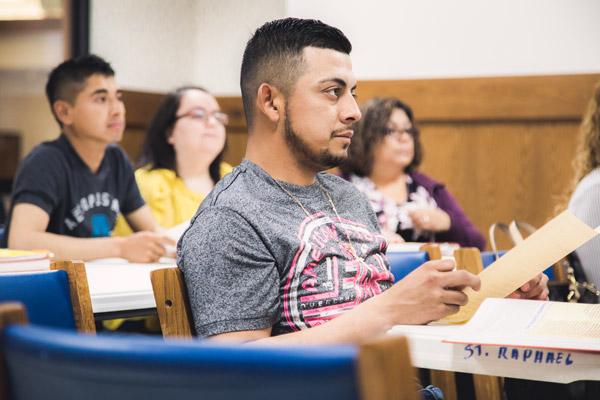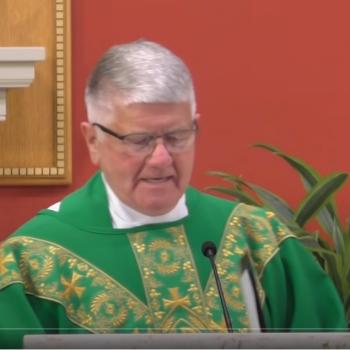
[ Another post on the general theme of becoming a “Street Catholic,” in which I offer a kind of unauthorized guide to joining the Roman Catholic Church, assuming no one talks you out of the idea first, of course. Which happens. In which case maybe you just go back to your old low-down life. ]
It’s a summer evening in Chicago some thirty years ago and I’ve walked around to the rear of Holy Name Cathedral, to the front door of the priests’ residence. I ring the bell, a young guy in black comes to the door, and I greet him by saying something snappy, like, “Hi. I’m interested in becoming a Catholic.”
I’m not sure what I thought would happen next. Maybe he would invite me back some morning that following week, we’d fill out some paperwork, and by the following Sunday I’m in the front row. Turns out that’s not how it works.
Growing up in a small town Baptist church in East Texas, my ideas of Catholicism were partly formed by the periodic witness of one Mr. Ralph DiGiglio, a former Catholic who would occasionally leave his place in the choir to come offer his personal testimony from the pulpit. Mr. DiGiglio was the butcher at the local Safeway and a nice fellow who always bought a newspaper from me when I passed by the store on my newspaper route on Saturday nights. I don’t now recall what he had to say, actually. But I’m pretty sure it was what we all wanted to hear — something about his being happy to escape all the wooky stuff Catholics are supposed to swallow. Like worshipping those Mary statues!
Nonetheless, I found myself enrolling in the Rite of Christian Initiation of Adults program — all ten months of it. Since I was already baptized (total immersion at that!) from my Baptist childhood, I would be going for Confirmation the following the Easter with rest of that year’s RCIA class.
The RCIA program offers an overview of the Church, its teachings, its outreach, that kind of thing. Here’s a fact: it’s mostly not for seekers burning to know new spiritual truths and practices. It’s for people who simply have some practical reason to want to have a Catholic ID: to get married in the Church, to align with their Catholic spouse’s faith, or maybe to remedy never having gotten baptized or confirmed as a child. (The unbaptized, by the way, are referred to by the term “catachumens” while the baptized are “candidates.” Catholics love odd jargon for things.)
So here’s the first thing you need to know: RCIA programs vary greatly from parish to parish. What they tend to have in common, unfortunately, is a kind of beige dullness — unless you get an interesting program director who might decide to talk a bit about Gregorian chant one evening and then the Berrigan brothers the next time.
Also: you will be assigned a sponsor, some parish member who will attempt to shepherd you through the program and answer your questions. My sponsor was a feisty, elderly British woman who was born in India, privately educated, and then married a Jewish businessman who was once a member of the Irgun terrorist organization in Israel. She gave me my first rosary, which I at first took for something like Catholic Mardi Gras beads until she whipped me into shape.
I had intended to insert a short, slightly tasteless anecdote here about how, just before Easter Week, one of my fellow candidates — a very cute woman whose misbehaving boyfriend, she told me, had been voted “Mr. Serbian Chicago” — invited me over to her place for a quiet dinner and then she … I dunno, it was all very confusing to a simple small-town Baptist like myself.
My idea of RCIA, if I ran the joint, would involve first studying the basic principles of Catholic social teachings and then making on-site visits to groups around your area who are plainly operating according to them. You’d get just enough doctrine so that you understand what your orders are before hitting the street and finding the ones we’re trying to help with our field hospital, as Pope Francis refers to the Church.
It’s a fair question why, given the Church’s recent history, anyone would want to join such a broken organization. It’s failing and it has always failed.
But by this point, I don’t think of it as an organization but more like a loose international movement of individuals focused on keeping the Gospel alive and serving the world.
If you become a part of this huge collection of humanity, you can hope to develop a heart for the poor and a desire for friendship with them — all this for your sake, keep in mind, not theirs.











